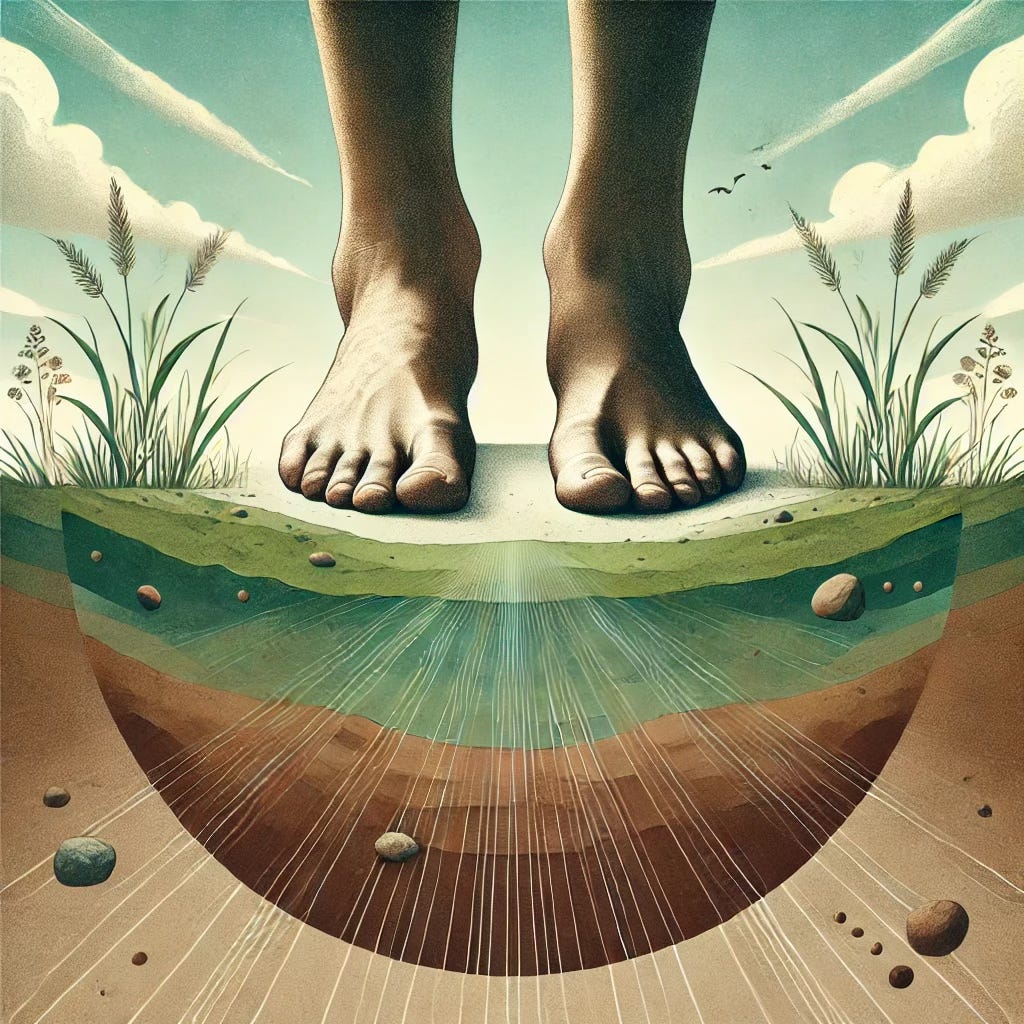What are your feet doing? Grounding Yourself Helps Expand Self-Awareness
How much of your life has happened without your conscious awareness? Sure, there are approximately 8 hours a day of sleep, which, doing the math, is 2920 hours, translated to 121 days or four months. Yup, four months out of the year is spent sleeping. Now let's expand on that and consider the number of times you've 'snapped to attention' and realized you'd been daydreaming and, amusingly, can't remember what was so important previously. This can be embarrassing when in a conversation with someone else and potentially quite dangerous when driving.
There is no experience we have that isn’t conscious. The form of that consciousness may change, from drug-effected to sleep to wakefulness and meditative, among others, but having an experience is equivalent to being conscious. An experience just adds a narrative structure to it when expressing it to yourself and others. Thing is, because consciousness is all there is when it comes to having a sense of being you, its very ubiquity becomes something we don’t always pay attention to or consider the power of it. Rather like the air we breathe, we blissfully go about our lives continuing to engage in the multi-system biological act of exchanging various gases, only becoming aware of it when things go awry.
However, the process of bringing attention to the breath and the various forms of meditation are practices that remind us of the power and influence to be wrought by bringing attention to that which we take for granted. That's why reminding yourself of the ground is so important.
Moving from Autopilot to Awareness
Have you ever considered yourself to be on 'autopilot'? For that matter, think back over the last week, how much can you fully remember and how much is hazy recall? Understand that this is entirely normal. If we were to attempt actively paying attention to every single bit of data, internal and external, we'd be overrun and go through a system crash. It'd be like watching Netflix and having a crystal clear image, only to have your internet provider throttle your speed, and everything goes grainy or stops altogether.
Taking the analogy one step further, conscious awareness requires that we not be able to bring attention to all the biological and natural systems at play in every moment of our lives. We couldn’t watch a TV show if we simultaneously had to pay attention to the electrical signals coming in through the cables to our TV or other device. This doesn’t mean that we should seek to actively ignore what’s going on beneath the surface or never seek to understand it better.
While we certainly don't want to get ourselves into a shutdown experience, even the smallest increase in awareness can help us live healthier mental lives. In fact, doing so doesn't even have to be done all the time; it can simply be focused on relationships, work, physical health, and so on. What area of your life would you like to understand better? Doing so requires greater awareness.
We like to be right, which leads us to double down on our stories of 'what is.' Challenging them requires two things: 1) increased awareness and 2) actively doing so from a space of positive exploration. Now, I don't mean 'positive' in the sense of happy, joyful, and smiling. 'Positive' here means active engagement or deliberate movement, an affirmative adding to what you're doing rather than subtracting or avoiding. Sometimes, doing so is not at all joyful and may even initially result in feelings of hurt or discontent. Thankfully, increasing awareness does not require any particular feeling attached to it.
Feet on the Ground
So, where to start? Regardless of what area in your life you'd like more awareness about, starting anywhere will have spillover. With that in mind, how are your feet? Seriously, how are they? What are they doing right now? How do they feel? Do you only notice them when they are in pain?
Our feet carry us everywhere, but we rarely pay them much attention while they're in use. In fact, paying special attention to your feet while walking will result in slowing down. That this results in not getting to a destination as quickly is likely why we're good with ignoring them so long as they're functioning. So it is with a great many parts of our lives.
Unless there's some kind of difficulty, we go about our lives without much awareness. Unfortunately, little things can creep up on us and harm us and our relationships if we're not paying attention. Further, the world in and around us doesn't stop influencing our decisions and ideas of who we are simply because we don't actively notice parts of it.
Taking even a small step, like deliberately noticing how you are stepping/moving, to expand awareness of a part of your life you aren't generally aware of can lay the ground for new decisions and behaviors.
The more you see, the more you have to work with. The more you see, the greater the potential to step away from the habits keeping you from moving forward. So, remind yourself of the ground and build a daily lifestyle that supports the goals you are moving towards.
Value-Based Goals: How to Get the Results You Want Now
Humanity’s Values is a 100% reader-supported publication. To help support the continued delivery of content you enjoy and build the community, please consider becoming a subscriber.
Resources:
Atomic Habits by James Clear
Being Wrong by Kathryn Schultz




